Jade Varden's Blog, page 50
November 16, 2013
Books on Film: Now, Voyager
I came to know Now, Voyager as a pretty famous Bette Davis flick. I adore Bette Davis, and in this film she's truly at her best. But this fantastic story of an Ugly Duckling is actually based on a trio of books by Olive Higgins Prouty. Now, Voyager is the third installment in the story.

The Book
Charlotte Vale lives in a big, fancy Boston house and she comes from a very well-known and well-to-do family. But Charlotte Vale still has every reason to feel miserable. She's under the thumb of her overbearing, domineering mother. Charlotte is overweight and under-groomed, dresses like a dowdy housewife and barely socializes outside the austere Vale family home.
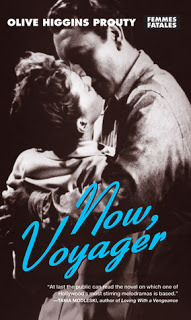
In this book, Charlotte has suffered a nervous breakdown. She's now under professional care, and she is blossoming. She's shed the extra weight and she's gone through a makeover. Finely-sculpted eyebrows now frame her thin, finely-boned face. Her upswept 'do is the epitome of style, and her clothes are fashionable, tasteful and expensive. In a word, she's fabulous.
The title of the story comes from a Walt Whitman poem, as the book will you tell you. Before going back to her rigid Boston home, Charlotte goes on a cruise to cap off her treatment. She makes many friends on board and truly enjoys herself. Best of all, Charlotte falls in love. He's debonair, he's polished, he's passionate...he's married.
Life is always a rocky road for Charlotte Vale. But all things must end, even her cruise, and Charlotte soon finds herself returning to Boston...and to her mother. Will Charlotte fall back into her frumpy ways? Will she ever see the handsome man from the cruise again? Where will her voyage end? You'll have to read it to find out.
The story is truly wonderful, but you can thank a different story for turning Now, Voyager into a feature-length film.
The Movie
The year was 1942, and the 1939 success of Love Affair was still impressive to execs at Warner Bros. The movie would later be re-made as An Affair to Remember, but in this version it's Irene Dunn and Charles Boyer who star in the leading roles. They fall in love on a ship, and filmmaker Hal Willis hoped that Now, Voyager would remind moviegoers how much they love paying to see that sort of watery romance.
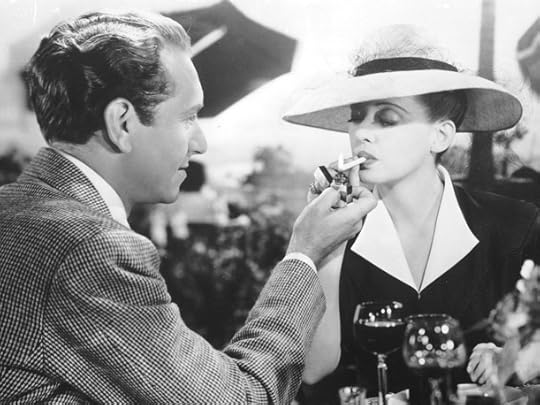
So Prouty was given $40,000 for her book and Irene Dunn immediately sprang to the top of the list for the role of Charlotte. But Norma Shearer was also interested in the role. The two had the same manager, who performed a balancing act until both actresses moved on to other projects. Already a screen legend, Bette Davis was having a huge fight with Jack Warner at the time, and wasn't taking any of his calls. A director friend told her about the movie, and Bette immediately changed her mind. She began to campaign to get the role, and the producer talked the studio into casting her.
She wore padded clothing and heavy eyebrows for the early scenes, hiding her face behind ill-fitting glasses and letting her unkempt hair hang all over the place. Davis quite successfully made herself frumpy and unattractive for the start of the film, making her later transformation all the more miraculous. She's truly stunning when she arrives for her cruise, every inch the glamorous woman of mystery and polish she's meant to be.
What Got Adapted?
The movie follows the book quite closely, and it's made all the more lavish by the presence of Davis in the leading role. Paul Henreid is the perfect love interest, and Claude Rains is the best possible father figure in his role as Dr. Jaquith. Gladys Cooper is perfectly chilling as the mother, and everything about this film is perfect. Davis's wardrobe is perfectly fantastic throughout.
The final line, which appears in the book verbatim, was rated number 46 on AFI's list of top 100 movie quotes. It deserves it. Watch Now, Voyager and read Charlotte's trilogy to explore the story even further. You won't be sorry!

The Book
Charlotte Vale lives in a big, fancy Boston house and she comes from a very well-known and well-to-do family. But Charlotte Vale still has every reason to feel miserable. She's under the thumb of her overbearing, domineering mother. Charlotte is overweight and under-groomed, dresses like a dowdy housewife and barely socializes outside the austere Vale family home.

In this book, Charlotte has suffered a nervous breakdown. She's now under professional care, and she is blossoming. She's shed the extra weight and she's gone through a makeover. Finely-sculpted eyebrows now frame her thin, finely-boned face. Her upswept 'do is the epitome of style, and her clothes are fashionable, tasteful and expensive. In a word, she's fabulous.
The title of the story comes from a Walt Whitman poem, as the book will you tell you. Before going back to her rigid Boston home, Charlotte goes on a cruise to cap off her treatment. She makes many friends on board and truly enjoys herself. Best of all, Charlotte falls in love. He's debonair, he's polished, he's passionate...he's married.
Life is always a rocky road for Charlotte Vale. But all things must end, even her cruise, and Charlotte soon finds herself returning to Boston...and to her mother. Will Charlotte fall back into her frumpy ways? Will she ever see the handsome man from the cruise again? Where will her voyage end? You'll have to read it to find out.
The story is truly wonderful, but you can thank a different story for turning Now, Voyager into a feature-length film.
The Movie
The year was 1942, and the 1939 success of Love Affair was still impressive to execs at Warner Bros. The movie would later be re-made as An Affair to Remember, but in this version it's Irene Dunn and Charles Boyer who star in the leading roles. They fall in love on a ship, and filmmaker Hal Willis hoped that Now, Voyager would remind moviegoers how much they love paying to see that sort of watery romance.

So Prouty was given $40,000 for her book and Irene Dunn immediately sprang to the top of the list for the role of Charlotte. But Norma Shearer was also interested in the role. The two had the same manager, who performed a balancing act until both actresses moved on to other projects. Already a screen legend, Bette Davis was having a huge fight with Jack Warner at the time, and wasn't taking any of his calls. A director friend told her about the movie, and Bette immediately changed her mind. She began to campaign to get the role, and the producer talked the studio into casting her.
She wore padded clothing and heavy eyebrows for the early scenes, hiding her face behind ill-fitting glasses and letting her unkempt hair hang all over the place. Davis quite successfully made herself frumpy and unattractive for the start of the film, making her later transformation all the more miraculous. She's truly stunning when she arrives for her cruise, every inch the glamorous woman of mystery and polish she's meant to be.
What Got Adapted?
The movie follows the book quite closely, and it's made all the more lavish by the presence of Davis in the leading role. Paul Henreid is the perfect love interest, and Claude Rains is the best possible father figure in his role as Dr. Jaquith. Gladys Cooper is perfectly chilling as the mother, and everything about this film is perfect. Davis's wardrobe is perfectly fantastic throughout.
The final line, which appears in the book verbatim, was rated number 46 on AFI's list of top 100 movie quotes. It deserves it. Watch Now, Voyager and read Charlotte's trilogy to explore the story even further. You won't be sorry!
Published on November 16, 2013 05:30
November 14, 2013
Writing 101 Q&A: Small Press Instead of Self-Publishing
Today I'm pleased to host Jac Wright, author of The Reckless Engineer. He's a little different than the other authors I feature on the blog: he's not self-published. I decided to pick his brain in a Q&A session, and learn how different he is from the indies I've known.
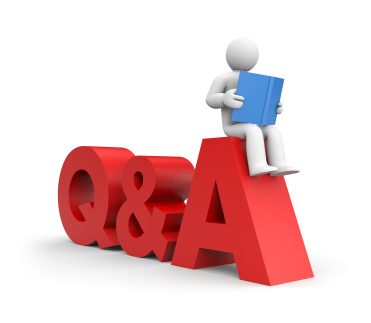
Q&A with author Jac Wright
JV: I see that the main character of The Reckless Engineer, Jeremy Stone, has an educational background similar to your own. How much of the character is modeled after you? Jac Wright: Great question. A lot of Jeremy’s character is modeled after me and my good friend, but even more is modeled after what I should like to be. Jeremy lives the ideal life I should like to live and I live it through him. JV: You’re an engineer, like your main character. If I don’t understand the first thing about engineering, will I still be able to enjoy and understand the book?
Jac Wright: Of course you will. You will understand and enjoy the books just like you would enjoy the engineer Barney’s role in the old Mission Impossible series; like you would enjoy Indiana Jones movies without knowing much about archeology; and like you would enjoy Star Trek without being a physicist. Everything is detailed in terms that a non-engineer would understand. The thing you would enjoy is his courageous and adventurous nature. Engineers are very good inventors and problem solvers. You will therefore enjoy his versatility and resourcefulness like that of MacGuyver, and his ingenious skills and problem solving abilities.
JV: Your books contain a lot of drama and conflict. When you want drama, which authors or TV shows do you turn to? Jac Wright: I grew up watching Tales of the Unexpected which is based on Roald Dahl’s adult books, the old Mission Impossible series, the Perry Mason series, and MacGuyver. My father and I had our favourite seats in front of the TV for the shows every week. At one time, I used to read Roald Dahl and Erle Stanley Garner as if I were possessed.I also love more modern series like Columbo, Monk, Dexter, The Good Wife, and the new BBC drama Death in Paradise. As you can see, they are mostly suspense and legal drama, like my books.The authors I adore are Patricia Highsmith, Roald Dahl, and Charles Dickens. Secondly I also like Ian Rankin, Benjamin Black, and Michael Connelly. JV: You’re also a published poet. What inspired you to start writing full-length novels? Jac Wright: I studied poetry, drama, and literature for 14 years at weekend Speech & Drama school my mother enrolled me in when I was 3. Poetry was the first thing I wrote that was not for some coursework; and I started writing poetry when I was at university at Stanford and kept writing over the years. I called the collection "Shades of Love." Later on I started adding short stories to the collection. I have about half a dozen short stories written ,which I separated out to a new series under the title "Summerset Tales."It just occurred to me that I should write a full-length series about 2007. One requires some level of maturity and life experience to write with impact, and I felt I was ready about this time.I knew I wanted the series lead to be an electrical engineer like me, and I knew I wanted the series to be suspense-driven psychological thrillers. Then I knew I wanted the first story to be based in Portsmouth, Charles Dickens’ birthplace, as a tribute to the author whose works taught me how to tell a tale early in life. I have loved English literature since I my mother enrolled me in weekend Speech & Drama classes when I was 3 years old. My mother had this rack full of books like The Pickwick Papers, The Tale of Two Cities, David Copperfield, Lorna Doone, The Animal Farm, etc. stacked on it along with piles of Readers’ Digests. She used to read to me from them when I was too young to read; and soon I was reading them myself. That sparked my interest as a reader and a spectator very early and Dickens’ stories were a large part of those childhood tales.That was how The Reckless Engineer series was born.JV: Your publisher, Soul Mate, specializes in romantic fiction. Do you consider The Reckless Engineer to be primarily a romance? Jac Wright: Soul Mate Publishing is expanding out to other genres. There are romantic undercurrents in The Reckless Engineer, but it is primarily suspense fiction. The Reckless Engineer and The Closet each examines a lead protagonist who is driven by romantic love and passion; each tale examines how it can blind the protagonist and how much trouble it can get him into. Hence, both stories are strongly romance-driven. JV: How did you find Soul Mate Publishing, and did you ever consider self-publishing? Jac Wright: Once the manuscript for The Reckless Engineer was finished, I had to send out about 60 letters enclosing the first fifty pages of the manuscript and a SASE (a self-addressed stamped envelope) in each. Then it was a long process of answering responses to the queries and protracted negotiations. It was not a difficult process, but it was lengthy and time-consuming. I got offers from 6 publishers and I know I have picked the best because of the instant rapport I felt with my editor.
JV: How much impact did your agent and/or publishers have on The Reckless Engineer series?Jac Wright: The main story was already written and the plot and characters have remained the same in essence. However, there was about a 2 month long editing period with my editor, Debby Gilbert, from Soul Mate Publishing. That process transformed the story by adding depth to it. Debbie guided me to add more visceral emotion and scenes that engaged all the senses, and not purely vision. One editing note she put on the manuscript has stuck to my mind. She had crossed out the last sentence in a chapter and had edited the one before, adding the note: "You never and a chapter on your protagonist going to sleep. It is a cue to the reader that he or she can do so, too." That’s right, reader, we intend to keep you up at the edge of your seats all night long. JV: What’s your next project? Jac Wright: Two more – The Bank Joband Buy, Sell, Murder – are half-written.I have started the fifth, In Plain Sight, with just the plot and the main characters designed and only the first chapter written. I hope to finish writing at least two of them in 2014.
The Reckless Engineer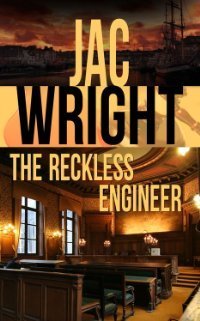
Love is a battlefield. Who will come out of it alive?
Harry Duncan Wood runs a hotel in the historic city of Bath with his beautiful young wife. When he falls in love with Mill House, an old greystone farmhouse on the banks of river Avon among the soaring hills of Somerset, and sets about moving his family there, the first appearances of the cracks in the marriage take him by surprise. Is his wife seeing another man? Duncan needs to get to the bottom of the affairs for his own sanity. Sometimes, however, ignorance is bliss and will also keep everybody alive.
Jac Wright is a published poet, a published author, and an electronics engineer who lives in England. The Closet is the first in Wright's collection of literary short fiction, Summerset Tales, in which Wright explores characters struggling against their passions and social circumstances in the contemporary semi-fictional region of England called Summerset, with an added element of suspense. The collection is published as a series of individual tales in the tradition of Charles Dickens' The Pickwick Papers and Thomas Hardy's Wessex Tales. The first Summerset tale, The Closet, accompanies the first title in the author's full-length literary suspense series, THE RECKLESS ENGINEER, published by Soul Mate Publishing, New York.
About the Author
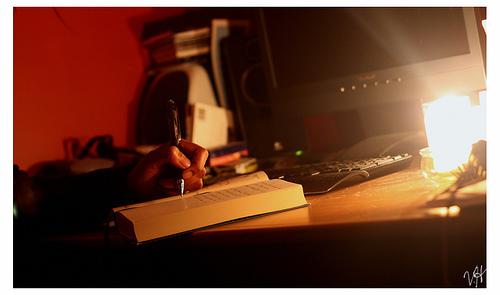 Jac Wright is a published poet, a published author, and an electronics engineer educated at Stanford, University College London, and Cambridge who lives and works in England. A published poet, Jac's first passion was for literary fiction and poetry as well as the dramatic arts.
Jac Wright is a published poet, a published author, and an electronics engineer educated at Stanford, University College London, and Cambridge who lives and works in England. A published poet, Jac's first passion was for literary fiction and poetry as well as the dramatic arts.
Jac also writes the literary short fiction series, Summerset Tales, in which Wright explores characters struggling against their passions and social circumstances.
Facebook Twitter Website Blog

Q&A with author Jac Wright
JV: I see that the main character of The Reckless Engineer, Jeremy Stone, has an educational background similar to your own. How much of the character is modeled after you? Jac Wright: Great question. A lot of Jeremy’s character is modeled after me and my good friend, but even more is modeled after what I should like to be. Jeremy lives the ideal life I should like to live and I live it through him. JV: You’re an engineer, like your main character. If I don’t understand the first thing about engineering, will I still be able to enjoy and understand the book?
Jac Wright: Of course you will. You will understand and enjoy the books just like you would enjoy the engineer Barney’s role in the old Mission Impossible series; like you would enjoy Indiana Jones movies without knowing much about archeology; and like you would enjoy Star Trek without being a physicist. Everything is detailed in terms that a non-engineer would understand. The thing you would enjoy is his courageous and adventurous nature. Engineers are very good inventors and problem solvers. You will therefore enjoy his versatility and resourcefulness like that of MacGuyver, and his ingenious skills and problem solving abilities.
JV: Your books contain a lot of drama and conflict. When you want drama, which authors or TV shows do you turn to? Jac Wright: I grew up watching Tales of the Unexpected which is based on Roald Dahl’s adult books, the old Mission Impossible series, the Perry Mason series, and MacGuyver. My father and I had our favourite seats in front of the TV for the shows every week. At one time, I used to read Roald Dahl and Erle Stanley Garner as if I were possessed.I also love more modern series like Columbo, Monk, Dexter, The Good Wife, and the new BBC drama Death in Paradise. As you can see, they are mostly suspense and legal drama, like my books.The authors I adore are Patricia Highsmith, Roald Dahl, and Charles Dickens. Secondly I also like Ian Rankin, Benjamin Black, and Michael Connelly. JV: You’re also a published poet. What inspired you to start writing full-length novels? Jac Wright: I studied poetry, drama, and literature for 14 years at weekend Speech & Drama school my mother enrolled me in when I was 3. Poetry was the first thing I wrote that was not for some coursework; and I started writing poetry when I was at university at Stanford and kept writing over the years. I called the collection "Shades of Love." Later on I started adding short stories to the collection. I have about half a dozen short stories written ,which I separated out to a new series under the title "Summerset Tales."It just occurred to me that I should write a full-length series about 2007. One requires some level of maturity and life experience to write with impact, and I felt I was ready about this time.I knew I wanted the series lead to be an electrical engineer like me, and I knew I wanted the series to be suspense-driven psychological thrillers. Then I knew I wanted the first story to be based in Portsmouth, Charles Dickens’ birthplace, as a tribute to the author whose works taught me how to tell a tale early in life. I have loved English literature since I my mother enrolled me in weekend Speech & Drama classes when I was 3 years old. My mother had this rack full of books like The Pickwick Papers, The Tale of Two Cities, David Copperfield, Lorna Doone, The Animal Farm, etc. stacked on it along with piles of Readers’ Digests. She used to read to me from them when I was too young to read; and soon I was reading them myself. That sparked my interest as a reader and a spectator very early and Dickens’ stories were a large part of those childhood tales.That was how The Reckless Engineer series was born.JV: Your publisher, Soul Mate, specializes in romantic fiction. Do you consider The Reckless Engineer to be primarily a romance? Jac Wright: Soul Mate Publishing is expanding out to other genres. There are romantic undercurrents in The Reckless Engineer, but it is primarily suspense fiction. The Reckless Engineer and The Closet each examines a lead protagonist who is driven by romantic love and passion; each tale examines how it can blind the protagonist and how much trouble it can get him into. Hence, both stories are strongly romance-driven. JV: How did you find Soul Mate Publishing, and did you ever consider self-publishing? Jac Wright: Once the manuscript for The Reckless Engineer was finished, I had to send out about 60 letters enclosing the first fifty pages of the manuscript and a SASE (a self-addressed stamped envelope) in each. Then it was a long process of answering responses to the queries and protracted negotiations. It was not a difficult process, but it was lengthy and time-consuming. I got offers from 6 publishers and I know I have picked the best because of the instant rapport I felt with my editor.
JV: How much impact did your agent and/or publishers have on The Reckless Engineer series?Jac Wright: The main story was already written and the plot and characters have remained the same in essence. However, there was about a 2 month long editing period with my editor, Debby Gilbert, from Soul Mate Publishing. That process transformed the story by adding depth to it. Debbie guided me to add more visceral emotion and scenes that engaged all the senses, and not purely vision. One editing note she put on the manuscript has stuck to my mind. She had crossed out the last sentence in a chapter and had edited the one before, adding the note: "You never and a chapter on your protagonist going to sleep. It is a cue to the reader that he or she can do so, too." That’s right, reader, we intend to keep you up at the edge of your seats all night long. JV: What’s your next project? Jac Wright: Two more – The Bank Joband Buy, Sell, Murder – are half-written.I have started the fifth, In Plain Sight, with just the plot and the main characters designed and only the first chapter written. I hope to finish writing at least two of them in 2014.
The Reckless Engineer

Love is a battlefield. Who will come out of it alive?
Harry Duncan Wood runs a hotel in the historic city of Bath with his beautiful young wife. When he falls in love with Mill House, an old greystone farmhouse on the banks of river Avon among the soaring hills of Somerset, and sets about moving his family there, the first appearances of the cracks in the marriage take him by surprise. Is his wife seeing another man? Duncan needs to get to the bottom of the affairs for his own sanity. Sometimes, however, ignorance is bliss and will also keep everybody alive.
Jac Wright is a published poet, a published author, and an electronics engineer who lives in England. The Closet is the first in Wright's collection of literary short fiction, Summerset Tales, in which Wright explores characters struggling against their passions and social circumstances in the contemporary semi-fictional region of England called Summerset, with an added element of suspense. The collection is published as a series of individual tales in the tradition of Charles Dickens' The Pickwick Papers and Thomas Hardy's Wessex Tales. The first Summerset tale, The Closet, accompanies the first title in the author's full-length literary suspense series, THE RECKLESS ENGINEER, published by Soul Mate Publishing, New York.
About the Author
 Jac Wright is a published poet, a published author, and an electronics engineer educated at Stanford, University College London, and Cambridge who lives and works in England. A published poet, Jac's first passion was for literary fiction and poetry as well as the dramatic arts.
Jac Wright is a published poet, a published author, and an electronics engineer educated at Stanford, University College London, and Cambridge who lives and works in England. A published poet, Jac's first passion was for literary fiction and poetry as well as the dramatic arts.Jac also writes the literary short fiction series, Summerset Tales, in which Wright explores characters struggling against their passions and social circumstances.
Facebook Twitter Website Blog
Published on November 14, 2013 05:30
November 13, 2013
Writing 101: So, What Should You Write About?
Sometimes, inspiration strikes and you find yourself filled with great ideas for lots of books. You scribble them all down, you see them through to the end. And one day, what if you find yourself out of ideas? What do you do...when you don't know what to write about next?
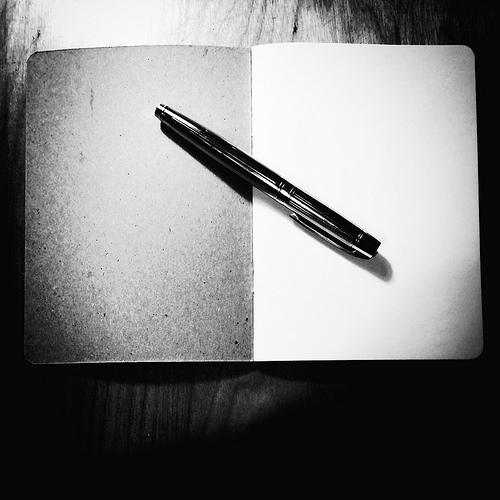
Everyone Doesn't Have a Story
Eventually, every writer ends up staring at a blank page, inevitably thinking what next? When you don't know what to write about, you may find yourself coming up with all sorts of ideas you're not really passionate about. Maybe I should write something like Harry Potter, only about a witch. Maybe I should write about a fierce competition, like in the Hunger Games.
You start writing, you lose interest, you quit and try another project. It's possible to wade around for years in this quagmire, unable to finish a project and yet unable to find one that really strikes you. If you're having trouble figuring out what to do next, don't try to force yourself into writing a new story. Find one that's going to inspire you.
Make a list: Make a list of your favorite books. Now break it down. Write down what it is that you love about these books, in the simplest possible terms. Think back: Are there any particular points of history or historical stories that strike you? What is it about them that you like? Add these words and phrases to your list. Your passions: What do you do in your free time? When no other chores or responsibilities await you? Write it down. Look over your list, and circle the stuff that stands out the most. Are you getting some good story ideas yet? You should always write about something that interests you, something you enjoy thinking about. What makes you think, gives you pause, causes your heart to race? Write about those things, and you should start to get plenty of good ideas.

Everyone Doesn't Have a Story
Eventually, every writer ends up staring at a blank page, inevitably thinking what next? When you don't know what to write about, you may find yourself coming up with all sorts of ideas you're not really passionate about. Maybe I should write something like Harry Potter, only about a witch. Maybe I should write about a fierce competition, like in the Hunger Games.
You start writing, you lose interest, you quit and try another project. It's possible to wade around for years in this quagmire, unable to finish a project and yet unable to find one that really strikes you. If you're having trouble figuring out what to do next, don't try to force yourself into writing a new story. Find one that's going to inspire you.
Make a list: Make a list of your favorite books. Now break it down. Write down what it is that you love about these books, in the simplest possible terms. Think back: Are there any particular points of history or historical stories that strike you? What is it about them that you like? Add these words and phrases to your list. Your passions: What do you do in your free time? When no other chores or responsibilities await you? Write it down. Look over your list, and circle the stuff that stands out the most. Are you getting some good story ideas yet? You should always write about something that interests you, something you enjoy thinking about. What makes you think, gives you pause, causes your heart to race? Write about those things, and you should start to get plenty of good ideas.
Published on November 13, 2013 05:30
November 12, 2013
Writing 101: What Can $5 Buy?
Indie authors are advised, again and again, to spend money on making their books high quality. Pay for a good cover, the experts say. Pay for an editor who will go through your book line-by-line. Pay for an illustrator, a great trailer...the list could really go on and on if I wanted it to. But here's the thing: lots of indie authors are two steps away from broke. Pay for a good cover? It's hard enough just to pay for dinner! But indie authors do have options that don't necessarily include shelling out a cool $40 for a graphic designer. With $5, you can buy a lot.

Got Five On It?
With just $5, it's possible purchase a pretty great-looking book cover. Take another 5 bucks, and pay someone for original illustrations. Or, use that 5 to have a promotional video made. You can even use it to have someone give you a thoughtful review of your work, but it would be strictly for your own use. It's unethical to pay for reviews on sites like Amazon.
The website where all of this can happen? It's aptly named Fiverr, naturally, and it really does offer lots of opportunities. Some of them are good, but others can be pitfalls. Let me very clear in stating that I do not advocate the buying of social media followers or updates, nor do I advocate the purchasing of blog posts. As an author, you should really provide original content and I'm pretty certain that social media sites frown on the buying of social media followers.
But purchasing a real service, such as original artwork, is perfectly ethical. And when it costs just $5, it's extremely beneficial to indie authors who haven't got a whole lot of cash to spread around.

Got Five On It?
With just $5, it's possible purchase a pretty great-looking book cover. Take another 5 bucks, and pay someone for original illustrations. Or, use that 5 to have a promotional video made. You can even use it to have someone give you a thoughtful review of your work, but it would be strictly for your own use. It's unethical to pay for reviews on sites like Amazon.
The website where all of this can happen? It's aptly named Fiverr, naturally, and it really does offer lots of opportunities. Some of them are good, but others can be pitfalls. Let me very clear in stating that I do not advocate the buying of social media followers or updates, nor do I advocate the purchasing of blog posts. As an author, you should really provide original content and I'm pretty certain that social media sites frown on the buying of social media followers.
But purchasing a real service, such as original artwork, is perfectly ethical. And when it costs just $5, it's extremely beneficial to indie authors who haven't got a whole lot of cash to spread around.
Published on November 12, 2013 05:30
November 11, 2013
Writing 101: Update Your Readers
If you're not telling your readers about new and upcoming events on your schedule, you're not doing all the marketing you could be doing. Always update you readers...even when you haven't got a lot of stuff to tell them about.

Hear Ye, Hear Ye
Facebook and Twitter aren't just for sharing links to your blog and your Amazon author central page. You should definitely be using social media to give readers regular updates about what you're working on. Tell them when you pick a title, when you get your cover, when you create a trailer and even when you're struggling through that gnarly chapter.
Involve your readers in the process, even if it's only through short updates that let them know what you're working on. You'll generate more and more excitement for your book the more you talk about it, so talk about it! Let readers know when you're up to and what you're thinking about the book to get them excited about the project as well. When they feel more involved, they'll get more excited.
Newsletters are a good way to keep readers updated as well, but there's a bit more pressure here. You have to provide interesting content in a newsletter to make it worth reading. Use a widget to include an email signup on your blog, and you're ready to start releasing your news.

Hear Ye, Hear Ye
Facebook and Twitter aren't just for sharing links to your blog and your Amazon author central page. You should definitely be using social media to give readers regular updates about what you're working on. Tell them when you pick a title, when you get your cover, when you create a trailer and even when you're struggling through that gnarly chapter.
Involve your readers in the process, even if it's only through short updates that let them know what you're working on. You'll generate more and more excitement for your book the more you talk about it, so talk about it! Let readers know when you're up to and what you're thinking about the book to get them excited about the project as well. When they feel more involved, they'll get more excited.
Newsletters are a good way to keep readers updated as well, but there's a bit more pressure here. You have to provide interesting content in a newsletter to make it worth reading. Use a widget to include an email signup on your blog, and you're ready to start releasing your news.
Published on November 11, 2013 05:30
November 9, 2013
Hope's Rebellion: Trailer Reveal
Want to know more about my newest book Hope's Rebellion? Just watch the trailer. I'm exclusively releasing it to my blog today just for you!
Published on November 09, 2013 05:30
November 7, 2013
Writing 101: Me...and My Cloud
I'm not the most technically-savvy girl in the world (in truth, I can't hardly figure out how to use my microwave), but even I have figured out this whole "cloud" business. And in figuring it out, I've made a discovery: every single author needs to start using a cloud immediately. I expect you to do so the minute you're done reading this post...because it really can't wait any longer.

Oh, That's Not My Head in the Clouds
Allow me to explain. First thing you have to get used to: "cloud" is a dumb name. I don't know who came up with it or why, but this is the way it works: it's online storage that you can access on just about any device that has Internet. That means I can work on Chapter 1 at my laptop. One minute later, I can carry my phone outside and read what I just wrote. The files I change automatically update themselves when I turn on my device.
The benefits of this type of access are clear. As long as you know how to access your cloud, you can access any of the files you might need. Your aunt's practically-ancient Windows 1998 desktop? Done. Your brother's crazy, multicolored, brand-new tablet? Sure, no problem. The slow computer up at the one library you've got within 100 miles? Absolutely. If you've got Internet, you can probably get to your stuff. That makes it possible to write and work anywhere at any time, and I don't have to tell you how amazing that is.
Because I'm going to focus on a second benefit, one that's a little bit more unsung: storage. When you're using a cloud for file storage, you don't have to rely on you computer to keep that story safe. If you get some weird virus or you drop your machine in the swimming pool again (oops), you're not going to lose the novel you were almost finished writing. It's saved on your cloud!!
This is why every author everywhere needs to start using this technology right now. A good file-storing service will keep their own backups of your stuff, so when your computer freaks out and your hard drive freezes and your laptop gets mangled in yet another unfortunate loose dog accident you will not lose the important files you need for your book. I fell so in love with my cloud, I uploaded all my book files onto it. And yeah, I've got space to spare. That's another benefit of using a cloud: you get a lot of free space. For writers who have mostly .doc files, you just can't beat it.
So all you need now is a cloud of your own. I use Dropbox, but I also hear great things about Google's cloud. When you start looking, you'll find a ton of different cloud options out there.

Oh, That's Not My Head in the Clouds
Allow me to explain. First thing you have to get used to: "cloud" is a dumb name. I don't know who came up with it or why, but this is the way it works: it's online storage that you can access on just about any device that has Internet. That means I can work on Chapter 1 at my laptop. One minute later, I can carry my phone outside and read what I just wrote. The files I change automatically update themselves when I turn on my device.
The benefits of this type of access are clear. As long as you know how to access your cloud, you can access any of the files you might need. Your aunt's practically-ancient Windows 1998 desktop? Done. Your brother's crazy, multicolored, brand-new tablet? Sure, no problem. The slow computer up at the one library you've got within 100 miles? Absolutely. If you've got Internet, you can probably get to your stuff. That makes it possible to write and work anywhere at any time, and I don't have to tell you how amazing that is.
Because I'm going to focus on a second benefit, one that's a little bit more unsung: storage. When you're using a cloud for file storage, you don't have to rely on you computer to keep that story safe. If you get some weird virus or you drop your machine in the swimming pool again (oops), you're not going to lose the novel you were almost finished writing. It's saved on your cloud!!
This is why every author everywhere needs to start using this technology right now. A good file-storing service will keep their own backups of your stuff, so when your computer freaks out and your hard drive freezes and your laptop gets mangled in yet another unfortunate loose dog accident you will not lose the important files you need for your book. I fell so in love with my cloud, I uploaded all my book files onto it. And yeah, I've got space to spare. That's another benefit of using a cloud: you get a lot of free space. For writers who have mostly .doc files, you just can't beat it.
So all you need now is a cloud of your own. I use Dropbox, but I also hear great things about Google's cloud. When you start looking, you'll find a ton of different cloud options out there.
Published on November 07, 2013 05:30
November 6, 2013
Writing 101: NaNoWriMo, National Novel Writing
You're going to be seeing a lot of stuff about NaNoWriMo on Twitter, Goodreads and book blogs this month...because NaNoWriMo stands for National Novel Writing Month. And I've always sort of thought it was a really, really horrible idea.

Rushing Creativity
NaNoWriMo is a national challenge in which authors compete to completely craft a 50,000-word novel (which is technically a novelette in most genres) by midnight on November 30. This means you ought to come up with the concept, the outline, the research and the finished product in 30 days.
Talk about a challenge. NaNoWriMo is actually a great event that promotes writing and reading all over the world, and as a gimmick it truly works to promote the written word. But as a writing challenge, I'm not sure I can buy into it. You see, I don't believe in rushing creativity.
Nobody put out a stopwatch while Michelangelo was painting, you know what I mean? I'm not the biggest advocate for setting daily goals or forcing oneself to write, because when it's just not coming then it's not. If you're writing just to write instead of writing because you feel the need to write...well, are you really writing?
Not to wax too philosophical, but if you're rushing creativity in order to win a contest (or even just to take part in one), you're putting yourself in a box. You're telling yourself that you must write within certain confines. I don't think you should fetter your own creativity in any way. The book I loved the most took me two years to write and countless years to get over writing (because I'm not over iy yet). I didn't even get the research for that book done in a month, much less the story itself. Most books deserve to be considered for more than a month in order to be properly written.
My final thought on NaNoWriMo? Time limits are for races...but not necessarily for writing.

Rushing Creativity
NaNoWriMo is a national challenge in which authors compete to completely craft a 50,000-word novel (which is technically a novelette in most genres) by midnight on November 30. This means you ought to come up with the concept, the outline, the research and the finished product in 30 days.
Talk about a challenge. NaNoWriMo is actually a great event that promotes writing and reading all over the world, and as a gimmick it truly works to promote the written word. But as a writing challenge, I'm not sure I can buy into it. You see, I don't believe in rushing creativity.
Nobody put out a stopwatch while Michelangelo was painting, you know what I mean? I'm not the biggest advocate for setting daily goals or forcing oneself to write, because when it's just not coming then it's not. If you're writing just to write instead of writing because you feel the need to write...well, are you really writing?
Not to wax too philosophical, but if you're rushing creativity in order to win a contest (or even just to take part in one), you're putting yourself in a box. You're telling yourself that you must write within certain confines. I don't think you should fetter your own creativity in any way. The book I loved the most took me two years to write and countless years to get over writing (because I'm not over iy yet). I didn't even get the research for that book done in a month, much less the story itself. Most books deserve to be considered for more than a month in order to be properly written.
My final thought on NaNoWriMo? Time limits are for races...but not necessarily for writing.
Published on November 06, 2013 05:30
November 5, 2013
Writing 101: Unplugging
Once upon a time, I imagine, writers sat in quiet little rooms with quill pens and scribbled away with real ink. By the light of a flickering candle, one assumes, the likes of Louisa Mae Alcott crafted Little Women and Jane Austen worked on Pride and Prejudice. Nowadays, most writers type on fancy electronic devices and interact directly with fans through Twitter. And apparently, lots of modern authors think it's very hard to craft stories in this fashion. I've seen it, time and time again, where famous authors advise that you unplug the Internet before you write. And I think this is the most ridiculous writing tip I have ever read...and I've read a lot of them.
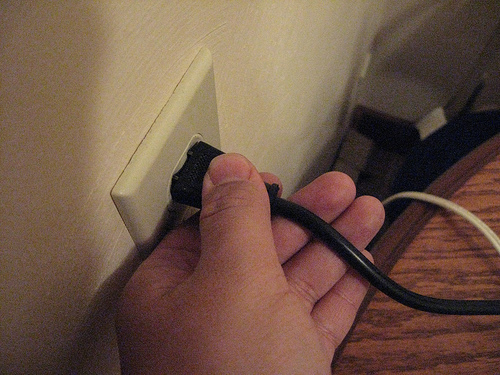
Unplug? Maybe You Haven't Heard of WiFi
For starters, do you even know how to disconnect your Internet? What kind of crazy archaic machines are these writers using to write their stories in the first place, and am I really supposed to believe that a Stephen King type has a computer so old he has to physically connect it to the Internet? I wasn't born yesterday, after all.
And I wasn't born in 1827. Maybe Stephen King sits and writes in a room that has a full library of reference materials, and he actually flips pages to find information when he's researching. But I live in a modern era where I don't have to open a dusty encyclopedia to learn about the breeding habits of pigs. I can just ask Google.
Unless I try to follow someone's weird writing tips and disconnect my laptop from the Internet, that is. Because I don't know about you, but there's lots of times when I have to stop writing in order to get some research done. While I was writing the Deck of Lies series, for example, I stopped often to consult my map because I don't have a photographic memory. Because I'm a modern girl, I didn't sit down at a drafting table and draw my own map and I didn't pull out a gigantic paper atlas to look at street names. I just used the Internet. Google even lets you create and save your own maps. I added markers to mine to show various locations that my characters visited.
If you have so much trouble focusing on writing that you actually have to unplug your Internet (which is now a euphemism for turn off your wifi), maybe the Internet isn't really the problem. There's always some sort of a distraction, because the reality is you can't lock yourself in a dark and quiet little room. The world is going to burst into it. If your house is anything like mine, the world is going to burst at least once every 30 minutes. You have to figure out how to maintain focus no matter what might be out there trying to pull you away from the keyboard, whether it's Twitter or a phone ringing off the hook.
Disconnecting the Internet is only going to slow you down when you have to do some research on the fly, maybe look up a new name or try to get fashion ideas for characters (what...you don't do that?). So I say unplugging is a totally bogus idea that's not really going to work. If you're that easily distracted, you're just going to pick up your phone and screw around with it to get to Twitter (I've been there too many times). It's a modern era. Like all the authors who came before, you are a product of the times. So learn how to work with all the tools at your disposal...or in spite of them.

Unplug? Maybe You Haven't Heard of WiFi
For starters, do you even know how to disconnect your Internet? What kind of crazy archaic machines are these writers using to write their stories in the first place, and am I really supposed to believe that a Stephen King type has a computer so old he has to physically connect it to the Internet? I wasn't born yesterday, after all.
And I wasn't born in 1827. Maybe Stephen King sits and writes in a room that has a full library of reference materials, and he actually flips pages to find information when he's researching. But I live in a modern era where I don't have to open a dusty encyclopedia to learn about the breeding habits of pigs. I can just ask Google.
Unless I try to follow someone's weird writing tips and disconnect my laptop from the Internet, that is. Because I don't know about you, but there's lots of times when I have to stop writing in order to get some research done. While I was writing the Deck of Lies series, for example, I stopped often to consult my map because I don't have a photographic memory. Because I'm a modern girl, I didn't sit down at a drafting table and draw my own map and I didn't pull out a gigantic paper atlas to look at street names. I just used the Internet. Google even lets you create and save your own maps. I added markers to mine to show various locations that my characters visited.
If you have so much trouble focusing on writing that you actually have to unplug your Internet (which is now a euphemism for turn off your wifi), maybe the Internet isn't really the problem. There's always some sort of a distraction, because the reality is you can't lock yourself in a dark and quiet little room. The world is going to burst into it. If your house is anything like mine, the world is going to burst at least once every 30 minutes. You have to figure out how to maintain focus no matter what might be out there trying to pull you away from the keyboard, whether it's Twitter or a phone ringing off the hook.
Disconnecting the Internet is only going to slow you down when you have to do some research on the fly, maybe look up a new name or try to get fashion ideas for characters (what...you don't do that?). So I say unplugging is a totally bogus idea that's not really going to work. If you're that easily distracted, you're just going to pick up your phone and screw around with it to get to Twitter (I've been there too many times). It's a modern era. Like all the authors who came before, you are a product of the times. So learn how to work with all the tools at your disposal...or in spite of them.
Published on November 05, 2013 05:30
November 4, 2013
Writing 101: Writing History
My least favorite subject in school was anything that had anything to do with history. My attitude was who cares about stuff that's already happened? But then, I became fascinated with a particular piece of history. So fascinated that I wanted to write a book about it. And I learned that writing history is some of the hardest writing you'll ever have to do.
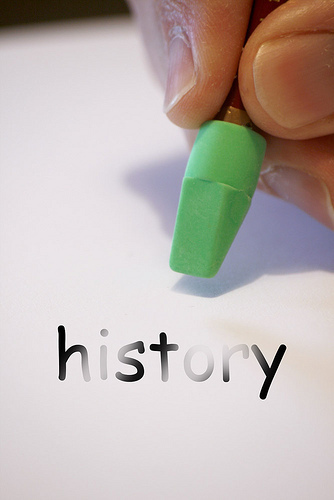
The Past Isn't the Past
History is definitely my favorite subject nowadays. I'm fascinated by period movies, historic novels, films made in the 1930s. Naturally, I wanted to write about history in order to sink myself into this obsession.
So for about two years, I became completely enraptured with a particular book project (it's the one I've mentioned several times in previous posts). Most of that time was not spent writing.
When you write about history, you have to research. Start with figuring out your own timeline. When does the story take place? Where does it take place? Now you need to look at particular historic events that occurred during your timeline. What happened in the world? What happened in the country where the story takes place? What happened in that particular city or town? Certain events will supersede your story. Because of particular historic significance, you'll be forced to include these events in the narrative somehow. For example, if your story occurs in Paris during the 1940s you absolutely can't ignore the German occupation because this affected everyone in Paris. Omitting it would be very bad storytelling.
Once you have a rough idea of the historic events that happened within the framework of your story, you can start to create a timeline. But you're not even close to being done with your research. Much of what you need to know you won't even discover until you sit down to write.
Writing history is a very stop-and-go experience. As soon as you get on a roll and you're in the zone, a question will crop up. Your character is in the middle of putting on a dress, and you have to say stop. What did the dresses look like in this particular year? What did women wear under them? What about the shoes? And how might she style her hair? You might not need all of this info, but you should gather all of it -- because you never quite know where a scene is going. I once had to stop writing my book while I researched the history of writing utensils for over an hour. This was due to a two-paragraph scene in which my character had to scribble a note.
Little details matter when you're writing history. And even if you're an obsessive researcher like me (because secretly I love doing it), you can easily screw this up. Because odds are good that you weren't born during the 1830s, so you're going to have trouble writing about it like you were really there. You can research the events, the setting, the clothing, the food, the writing utensils and even the furniture. But you're still not going to know the dialogue. It's very difficult to accurately capture the daily life, the local flavor and the particular nuances of a certain point in history.
Ordinary research techniques aren't enough. You have to go even further when you're writing history. Look for letters, diaries and other writings that were created during this time. Start reading. Absorb the flow of the words, the sentence structure, the colloquialisms. Look at pictures and maps of the era. Study the architecture, the methods of travel, how they used to cook chicken (or whatever). Every detail has to be accurate when you're writing history because so many people love it, and certain readers will get frustrated over inaccuracies in even the most minor points (I'm one of those readers).
When you're writing history, you simply have to do a whole lot more. This is why so many writers avoid it, but when it's done well you may just create something amazing.

The Past Isn't the Past
History is definitely my favorite subject nowadays. I'm fascinated by period movies, historic novels, films made in the 1930s. Naturally, I wanted to write about history in order to sink myself into this obsession.
So for about two years, I became completely enraptured with a particular book project (it's the one I've mentioned several times in previous posts). Most of that time was not spent writing.
When you write about history, you have to research. Start with figuring out your own timeline. When does the story take place? Where does it take place? Now you need to look at particular historic events that occurred during your timeline. What happened in the world? What happened in the country where the story takes place? What happened in that particular city or town? Certain events will supersede your story. Because of particular historic significance, you'll be forced to include these events in the narrative somehow. For example, if your story occurs in Paris during the 1940s you absolutely can't ignore the German occupation because this affected everyone in Paris. Omitting it would be very bad storytelling.
Once you have a rough idea of the historic events that happened within the framework of your story, you can start to create a timeline. But you're not even close to being done with your research. Much of what you need to know you won't even discover until you sit down to write.
Writing history is a very stop-and-go experience. As soon as you get on a roll and you're in the zone, a question will crop up. Your character is in the middle of putting on a dress, and you have to say stop. What did the dresses look like in this particular year? What did women wear under them? What about the shoes? And how might she style her hair? You might not need all of this info, but you should gather all of it -- because you never quite know where a scene is going. I once had to stop writing my book while I researched the history of writing utensils for over an hour. This was due to a two-paragraph scene in which my character had to scribble a note.
Little details matter when you're writing history. And even if you're an obsessive researcher like me (because secretly I love doing it), you can easily screw this up. Because odds are good that you weren't born during the 1830s, so you're going to have trouble writing about it like you were really there. You can research the events, the setting, the clothing, the food, the writing utensils and even the furniture. But you're still not going to know the dialogue. It's very difficult to accurately capture the daily life, the local flavor and the particular nuances of a certain point in history.
Ordinary research techniques aren't enough. You have to go even further when you're writing history. Look for letters, diaries and other writings that were created during this time. Start reading. Absorb the flow of the words, the sentence structure, the colloquialisms. Look at pictures and maps of the era. Study the architecture, the methods of travel, how they used to cook chicken (or whatever). Every detail has to be accurate when you're writing history because so many people love it, and certain readers will get frustrated over inaccuracies in even the most minor points (I'm one of those readers).
When you're writing history, you simply have to do a whole lot more. This is why so many writers avoid it, but when it's done well you may just create something amazing.
Published on November 04, 2013 05:30



